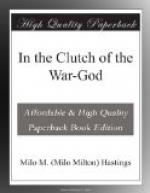The first two years of war dragged on in the Pacific. American grain was of course cut off from Japan and the government authorities ordered the people to plow up their flower gardens and plant food crops.
The Americans had too much territory to protect to take the offensive and their Pacific fleet lay close to Manila, where, with the help of land aviation forces, they hoped to hold the possession of the islands, which according to the popular American view was supposed to be the prize for which the Japanese had gone to war.
The test of the actual warfare proved several things upon which mankind had long been in doubt. One of these was that, with all the expert mechanism that science and invention had supplied, the personal equation of the man could not be eliminated. Aviation increased the human element in warfare. To shoot straight requires calm nerves, but to fly straight requires also agility and endurance.
The American aeroplanes were made of steel and aluminum, and when they hit the water they sank like lead, but the Japanese planes were made of silk and bamboo, and their engines were built with multiple compartment air tanks and after a battle the Japanese picked up the floating engines and placed them, ready to use, in inexpensive new planes.
* * *
In the nineteenth month of the war, Manila surrendered, and the emblem of the rising sun was hoisted throughout the Philippine Islands. The remnant of the American fleet retreated across the Pacific, and the world supposed that the war was over.
But Japan refused the American proposals of peace, which conceded them the Philippines, unless the United States be also opened to universal immigration. And so it was that when Japan, in addition to accepting the Philippines, demanded the right to settle her cheap labor in the United States, the American authorities cut short the peace negotiation and began concentrating troops and battleships along the Pacific Coast in fear of an invasion of California.
* * *
With Ethel Calvert’s adoption into Professor Oshima’s family there came a great change in her life. At first, she accepted Japanese food and Japanese clothes as the old-time prisoner accepted stripes and bread and water. But her captivity proved less repulsive than she expected and she was soon confessing to herself that there was much good in Japanese life. Professor and Madame Oshima were not talkative on general topics but the books on the shelves of the Professor’s library proved a godsend to the awakening mind of the young woman. Indeed, after a mental diet of French and English fiction upon which Ethel had been reared, the works on science and humaniculture, the dreams of universal brotherhood, the epics of a race in its conquests of disease and poverty were as meat and drink to her eager, hungry mind.




